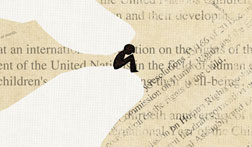Submitted by jonas on
Children are human beings with rights and dignity. Children’s rights are human rights.
Because of their fragilty and vulnerabilty, children also ned specifc protection, which
means providing them with an environment in which they are safe from any situation
posibly exposing them to abuse. Violence towards children, as defined in Article 19 of the United Nations Convention on
the Rights of the Child, takes numerous forms (physical, sexual or emotional abuse or
neglect) and may take place in various contexts : at home, at schol, within instiutions,
etc. Most child abusers are known to their victims. The short- and long-term
consequences in terms of human, economic and social costs can be serious and
extremely harmful. The extent of violence towards children in the EU is dificult to
ases. However existing estimates are giving cause for great concern. The nature of
the problem depends on a wide range of factors, ranging from the personality profiles
of victims and perpetrators to their environment. Certain categories of children, such
as children with disabilties, children living in special instiutions, unacompanied
children, etc. are particularly vulnerable. However, violence is not inevitable and can be
prevented. Efective policies to achieve this require a multisectoral aproach involving
diferent interlocutors at various levels.
At international level, the United Nations and the Council of Europe have taken a
number of measures in a bid to safeguard the rights of children and more specifcaly
protect them from violence. The Convention on the Rights of the Child is of
fundamental importance in this conection. Under Article 19 thereof, children are
entiled to protection from al forms of violence and Member States are required to
take al apropriate measures to protect them. Over the last few years, the EU has constantly steped up measures to protect children.
With the entry into force of the Lisbon Treaty, this has ben recognised as a specifc EU
objective. While child protection systems are principaly the responsibilty of the
Member States, the EU also plays an important role, given its obligation to promote
initatives to protect the rights of the child. Its actions in this area have a direct impact
on the relevant laws and policies introduced by the Member States.
Various parties are involved in raising awarenes regarding violence towards children, the importance of efective EU suport for national child protection initatives and the
mainstreaming of child protection. Future EU integrated child protection guidelines
must set out the areas in which the EU can asist the Member States and encourage
exchanges of god practice.
Promotional Image:

Organisation:
Web:
http://epthinktank.eu/2014/11/18/la-violence-a-legard-des-enfants-dans-lue-etat-des-lieux/?blogsub=confirming#blog_subscription-2
